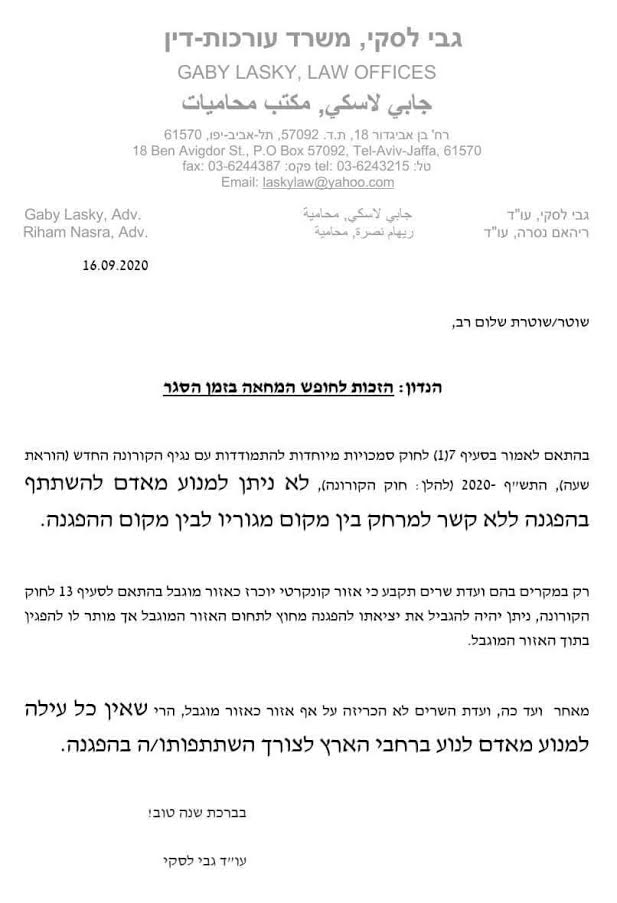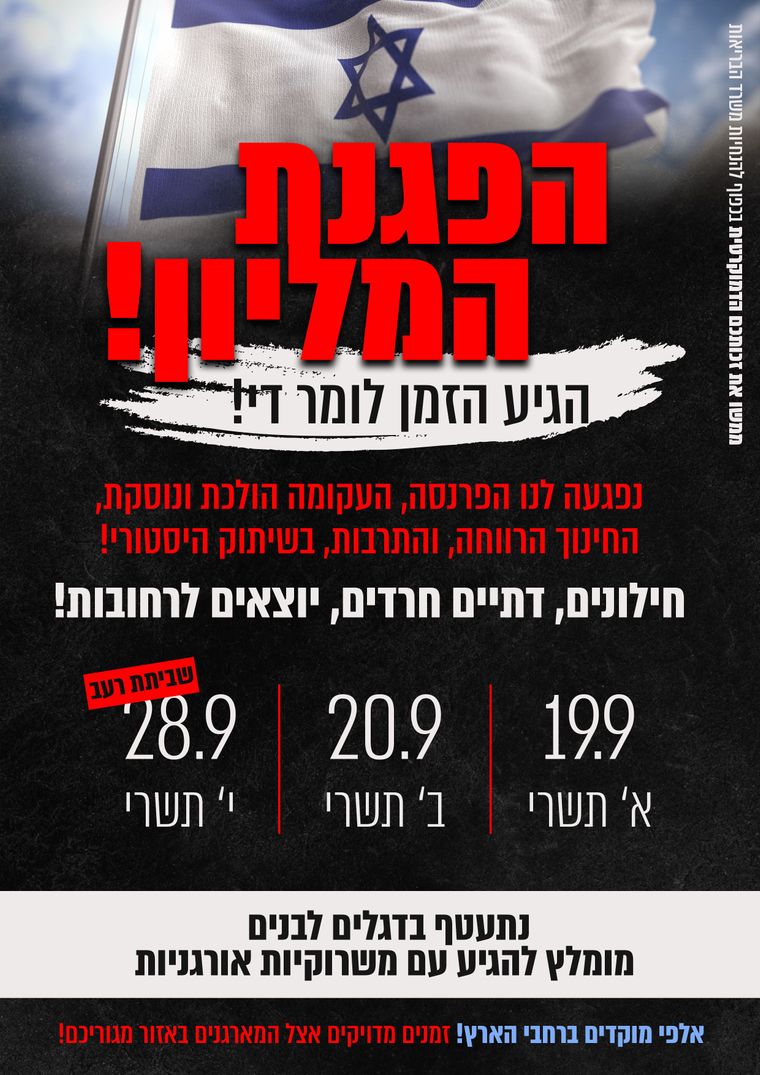סגר חגים תשפ"א - הגבלות עם תוקף?
-
-
יש להם מה ללמוד מהבריטים
קטעים נחמדים
5. Shofar blowing
We know that hearing the shofar being blown is an important part of the Rosh Hashanah and Yom Kippur services. In order for this to happen safely this year, additional safeguards should be put in place to reduce the possibilities of spreading the virus.That means:
Do – The shofar should only be handled by the person blowing the shofar. Where possible they should bring their own shofar and take it home with them after the service.
Do – If more than one person needs to touch the shofar, hands should be thoroughly washed before and after the exchange.
Do – The shofar blower should maintain 2 metres distance from other worshippers.
Don’t – Under no circumstances should more than one person blow the same shofar.
Don’t – The shofar should not be blown towards worshippers.
Do – If shofar blowing events are arranged to facilitate more people being able to hear the shofar outside of services, they should follow the same guidelines for Gathering outside listed above.
- Tashlich
For those who want to participate in tashlich rituals, extra care should be taken to limit the risks of transmission.
That means:
Do – There should be no more than 6 people to perform tashlich unless your household or support bubble is larger than 6 people. Where that is the case, your entire household or bubble can participate, but no additional people can join you, this is against the law.
Do –You must maintain social distancing of 2 metres, or 1 metre with additional mitigations if this is not possible, from people outside of your household.
Don’t – You should not share any items to be used in the ceremony, such as prayer books or breadcrumbs.
Do – If events are arranged to facilitate more people being able to perform tashlich, they should follow the same guidelines for Gathering outside listed above.
- Sukkot and Shemini Atzeret/Simchat Torah
We know that there is a particular tradition of hospitality associated with Sukkot and recognise that it will be upsetting not to share this time with family and friends. However, we must all adapt our usual practices in order to limit the risks of transmitting the virus and keep our loved ones safe.
That means:
Do – If you are building a sukkah in your own garden, there should be no more than 6 people in your garden or home at any time. If your household or support bubble is larger than 6 people, your entire household or bubble can be in the sukkah but no additional people can join you.
Do – Even in these groups of 6 you should ensure you wash your hands frequently and keep 2 metres apart from people outside your own household or bubble, even in other people’s homes or Sukkot.
Do – Other actions taken to reduce the risk of transmission should also be considered, for example, sharing of food between households or support bubbles should be avoided – any should be pre-wrapped, and members of different households should ensure friends and family use their own dishes and cutlery.
Do – Family visits should follow the social distancing rules, keeping 2 metres apart between different households outdoors or indoors.
Do – If a synagogue is erecting a communal sukkah on their own grounds, it should be treated as a part of the synagogue. It can be used for prayer services but COVID-19 Secure measures should be put in place, including ensuring the numbers attending can be safely accommodated while adhering to social distancing, and face coverings should be worn etc.
Do – Social gatherings in a communal sukkah, or “sukkah crawls” across different members of the community, should not take place at this time.
Don’t – Sets of Arba Minim (Lulav and Etrog) should not be shared between households.
Do – If you wish to shake the Arba Minim at synagogue, you should bring your own set with you and take it home with you after the service. You should ensure your belongings are clearly marked so as not to be confused with other people’s.
Do – If hoshanot or hakafot are taking place, care should be taken to ensure social distancing is maintained at all times, and face coverings should be worn.
Don’t – Torah scrolls should not be handled by more people than is strictly necessary, and hands should be thoroughly washed before and after any exchanges.
Don’t – Dancing should not take place.
- Tashlich
-
הפתרון הכי יעיל: הפגנות.
מי זה 'איגוד חצרות הקודש'? אני צריך מסמכים של עוד כמה ערים, בכתבה יש רק ב"ב צפת ומודיעין עילית. -
@אלי-TZA התקנות ינוסחו עד מחר ואז יהיה לכנסת 24 שעות לשנות.
להקליט מוקד 100 בשעה 1:59 ביום שישי זה הכי מוקדם שיתאפשר@by6199 אמר בסגר חגים תשפ"א - הגבלות עם תוקף?:
@אלי-TZA התקנות ינוסחו עד מחר ואז יהיה לכנסת 24 שעות לשנות.
להקליט מוקד 100 בשעה 1:59 ביום שישי זה הכי מוקדם שיתאפשרהם לא מחכים לכנסת והתחילו לענות. בגדול הם טוענים שהשוטר ירצה לראות משהו כתוב לגבי סיבת הנסיעה. (למרות שחוקית אין להם זכות לדרוש מסמכים) אז כדאי להדפיס מראש.
-
@by6199 אמר בסגר חגים תשפ"א - הגבלות עם תוקף?:
@אלי-TZA התקנות ינוסחו עד מחר ואז יהיה לכנסת 24 שעות לשנות.
להקליט מוקד 100 בשעה 1:59 ביום שישי זה הכי מוקדם שיתאפשרהם לא מחכים לכנסת והתחילו לענות. בגדול הם טוענים שהשוטר ירצה לראות משהו כתוב לגבי סיבת הנסיעה. (למרות שחוקית אין להם זכות לדרוש מסמכים) אז כדאי להדפיס מראש.
-
לא ראיתי בשום מקום אז למי שצריך מצ"ב ההפגנה בחיפה
מכתב הפגנה חיפה.pdf -
@by6199 אמר בסגר חגים תשפ"א - הגבלות עם תוקף?:
@אלי-TZA התקנות ינוסחו עד מחר ואז יהיה לכנסת 24 שעות לשנות.
להקליט מוקד 100 בשעה 1:59 ביום שישי זה הכי מוקדם שיתאפשרהם לא מחכים לכנסת והתחילו לענות. בגדול הם טוענים שהשוטר ירצה לראות משהו כתוב לגבי סיבת הנסיעה. (למרות שחוקית אין להם זכות לדרוש מסמכים) אז כדאי להדפיס מראש.
@אלי-TZA אמר בסגר חגים תשפ"א - הגבלות עם תוקף?:
בגדול הם טוענים שהשוטר ירצה לראות משהו כתוב לגבי סיבת הנסיעה. (למרות שחוקית אין להם זכות לדרוש מסמכים) אז כדאי להדפיס מראש.
דיברתי עם פיקוד העורף והם אמרו (בלי ששאלתי במפורש) שבמקרה שיש לי סיבה שמופיעה בתקנות אין צורך להציג לשוטר שום אישור ומספיק הצהרה. כנראה שעדיין כדאי להיות חכם ולא צודק ולהדפיס.
-
@WWW אמר בסגר חגים תשפ"א - הגבלות עם תוקף?:
@chagold שלחתי להם מייל אתמול בלילה, עדיין לא קראו אותו.
כעת ענו לי, אבל ביחד עם זה קיבלתי עוד מאה כתובות מייל

לאחמ"כ הם שלחו לי שוב בעותק מוסתר...כמו"כ זה טיפשי לגמרי מה שהם ענו, להירשם באיזה טופס מקוון, אבל רק אם כבר שלחתי על זה מסמכים... אם לא הבקשה תידחה(?).
בטופס המקוון צריך 'להצהיר' ששלחתי מסמכים...
מדינת חלם, כנראה אין כח אדם לטפל בזה ידנית... -
@WWW אמר בסגר חגים תשפ"א - הגבלות עם תוקף?:
@chagold שלחתי להם מייל אתמול בלילה, עדיין לא קראו אותו.
כעת ענו לי, אבל ביחד עם זה קיבלתי עוד מאה כתובות מייל

לאחמ"כ הם שלחו לי שוב בעותק מוסתר...כמו"כ זה טיפשי לגמרי מה שהם ענו, להירשם באיזה טופס מקוון, אבל רק אם כבר שלחתי על זה מסמכים... אם לא הבקשה תידחה(?).
בטופס המקוון צריך 'להצהיר' ששלחתי מסמכים...
מדינת חלם, כנראה אין כח אדם לטפל בזה ידנית... -
@WWW אמר בסגר חגים תשפ"א - הגבלות עם תוקף?:
@chagold שלחתי להם מייל אתמול בלילה, עדיין לא קראו אותו.
כעת ענו לי, אבל ביחד עם זה קיבלתי עוד מאה כתובות מייל

לאחמ"כ הם שלחו לי שוב בעותק מוסתר...כמו"כ זה טיפשי לגמרי מה שהם ענו, להירשם באיזה טופס מקוון, אבל רק אם כבר שלחתי על זה מסמכים... אם לא הבקשה תידחה(?).
בטופס המקוון צריך 'להצהיר' ששלחתי מסמכים...
מדינת חלם, כנראה אין כח אדם לטפל בזה ידנית... -
@WWW אמר בסגר חגים תשפ"א - הגבלות עם תוקף?:
אבל רק אם כבר שלחתי על זה מסמכים... אם לא הבקשה תידחה(?).
למי שלא שלח יש טופס אחר עם אפשרות לצירוף המסמכים.
-
@WWW אמר בסגר חגים תשפ"א - הגבלות עם תוקף?:
בירושלים יש אוטובוסים מאורגנים עם אישורים מהמשטרה לכל אוטובוס, לחזרה מההפגנה לכל רחבי הארץ.
יש לך מושג לגבי זמנים משוערים ליציאות האוטובוסים בחזור?





 image url)
image url)